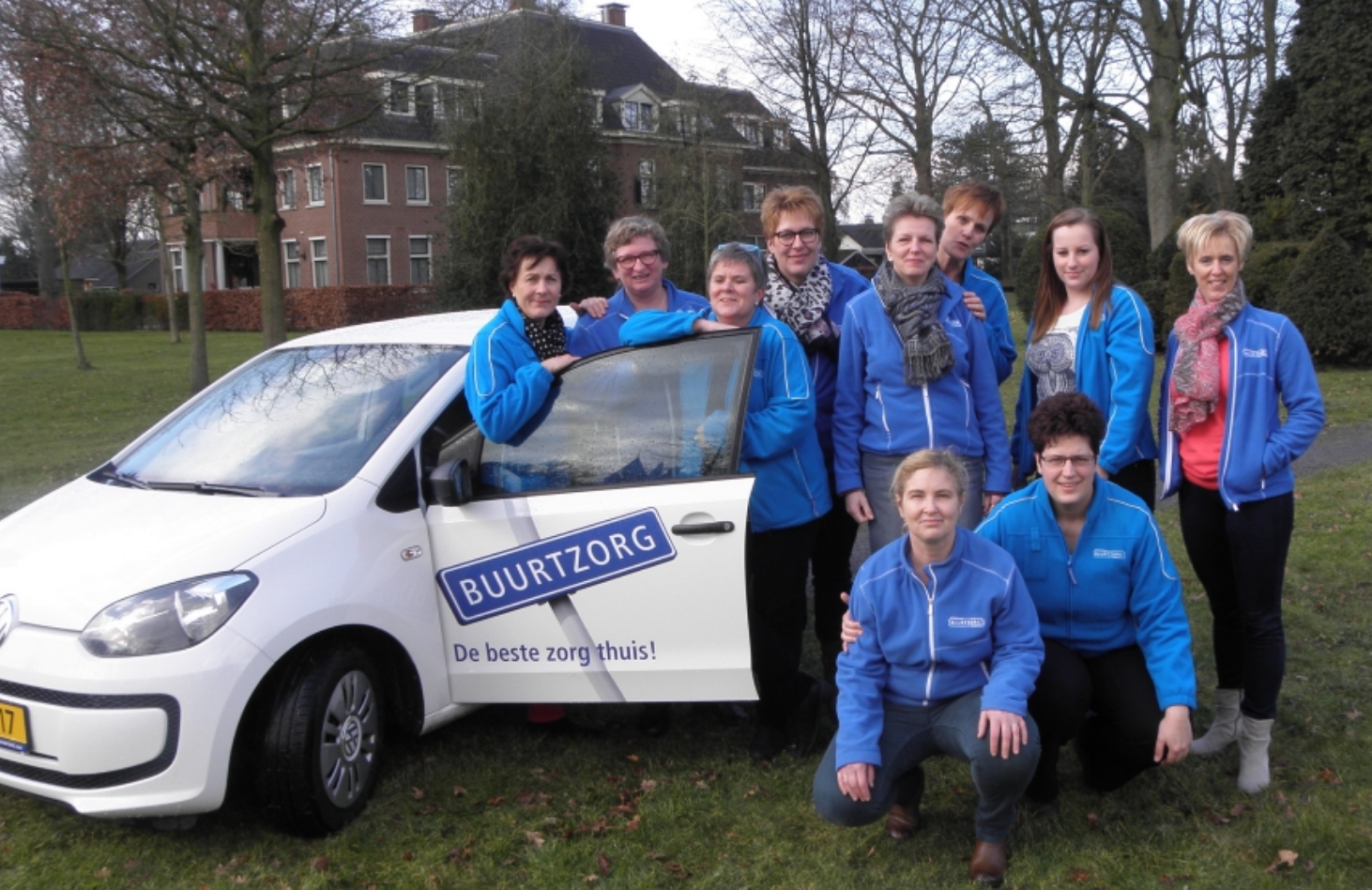Buurtzorg Nederland is a Dutch homecare company that is internationally renowned for its innovative use of independent and self-guided nurse teams who deliver high-quality care at relatively low cost. Buurtzorg is Dutch for “neighborhood care."

Buurtzorg Logo.
source ![]()
# Buurtzorg's Proof
It is possible to reshape a huge part of our health-care system which is meant to produce and deliver health and "care-services" at the pace of a conveyer belt according to more commons-friendly principles. The first thing a nurse does when visiting a new patient is to Ritualize Togetherness: sitting down and having a cup of coffee with the patient.
"Menschen sind keine Zahnräder, die man nach einem Organigramm organisieren kann." (Laloux 2016:54)
# Legal Status and Location
Buurtzorg is now moving beyond its Netherlands base to expand to the USA, where the organization faces the complications of dealing with multiple insurance payers, each with its own payment rules and procedures. This will make it difficult for nurses to do their own billing, as they do in Holland. Europe; transnational
xxxxx
# When did it start?
Buurtzorg began in the small city of Almelo in 2006. It was founded by Jos de Blok and a small team of professional nurses who were dissatisfied with the delivery of health care by traditional home care organizations in the Netherlands.
Jos de Blok, who had worked for 16 years as a nurse, explained why he founded Buurtzorg (html ![]() )
)
I was very critical about the way our job was organized. Quality was getting worse and worse, the client’s satisfaction was decreasing and the expenses were increasing.
# How?
10 years after its foundation, in 2016, some 9,000 Buurtzorg nurses were providing medical and support care, including dressing and bathing, to around 100,000 patients throughout the Netherlands. In most public or private systems, the latter services are delegated to lesser-trained and cheaper personnel, but at Buurtzorg nurse teams handle a wide range of services.

A team of Buurtzorg nurses.
source ![]()
According to Sharda S. Nandram html ![]() , the organization's approach is characterized by a simple, flat organizational structure through which a wide range of services, facilitated by information technology, are provided.
, the organization's approach is characterized by a simple, flat organizational structure through which a wide range of services, facilitated by information technology, are provided.
Buurtzorg's distinctive system of care is an integrated package of six sequential components that cannot be delivered separately:
- Assess the client’s needs. The assessment is holistic and includes medical issues, long term outlook, and personal/social needs. On the basis of the resulting information, an individual care plan is drafted.
- Map networks of informal care and involve relevant people in care. This includes such pro-active steps as knocking at the neighbor's door to solicit their assistance.
- Identify and include formal carers.
- Care delivery
- Support the client in his/her social roles.
- Promote self-care and independence html ![]()
Frédéric Laloux, who has studied Buurtzorg, sees the organization as an example of self-organization (in his term, "self-management"), wholeness and the cocreation of generative change.
The results of this needs-based approach are convincing. An Ernst & Young study concluded that Buurtzorg nurses spend 40% less time for patient's visits than prescribed by doctors, while reducing emergency room visits by 30%.
According to a KMPG study (January 2015), Buurtzorg has the most satisfied workforce of any Dutch company with more than 1,000 employees. It also found that Buurtzorg is a low-cost provider of home-care services, and that that efficiency is not attributable to its patient mix. (When the patients’ nursing home, physician, and hospital costs were added to the analysis, total per-patient costs were about average for the Netherlands.html ![]() )
Buurtzorg's holistic, care-focused system is saving hundreds of millions of taxpayers money. A case of Commons-Public-Partnership?
)
Buurtzorg's holistic, care-focused system is saving hundreds of millions of taxpayers money. A case of Commons-Public-Partnership?
As an organization that combines commons-based self-organization with market exchange (to the extent that state payments constitute a "market"), Buurtzorg is a hybrid. However, it is clearly committed to Cultivate Shared Purpose and Values -- namely, high quality care -- among its nurses. This requires that market-based motivations be made secondary to the group commitment.
This commitment can be seen in Buurtzorg's desire to Trust Situated Knowing and be creatively adaptive. Nurses are empowered to make a variety of on-site, patient-specific judgments about care. Indeed, nurses' commitment to empathetic understanding of patients' needs is the best way to honor care and provide appropriate responses. To improve team performance, Buurtzorg nurses have a keen desire to share knowledge often and widely.
By focusing care on neighborhoods -- and not just individuals in random, isolated locations -- Buurtzorg helps to make care more geographically mindful. The entire Buurtzorg approach stressed the need to deal with the whole person, in their social and physical context -- a powerful way to treat people in integrated ways and, indeed, to Strengthen the Nested-I.
# Peer Governance in Commons There are no managers nor team leaders. Self-governing teams of 10 to 12 highly trained nurses take equi-responsibility for the home care of 50 to 60 patients in a given neighborhood. This permits flexibility in work arrangements to meet both nurses’ and patients’ needs. Buurtzorg is very pro-active in using digital tools to enhance work processes and the work culture -- "managing through blogposts," it has been called.
The key principles that animate Buurtzorg's work, according to founder Jos de Block, are: autonomy of nurses; flat organization; low back office costs; and smart, integrated IT system for exchanging information.
In its provisioning of services, Buurzorg is clearly meeting the following dimensions: Develop Shared Purpose & Values, Assure Commoner's Consent in Decisionmaking, and Honor Transparency in a Sphere of Trust. The organization places great trust in the self-managed nurse teams, and places the human dimensions of care at the center of its work.
Self-Monitor, Mediate & Sanction -> still need to find out how oversight and sanctions apply.
# External Politics & Culture
Needs to be assessed.
Insert stories from Laloux.
Pool & Share - Cap & Share or Mutualize - Produce Cosmo-Locally - Use Convivial Tools - Decouple Giving & Taking - Rely on Distributed Structures - Protext & Extend Value Sovereignity - Direct Capital to Commons Provisioning - Establish Discrimination-Free Infrastructures
tag
# Realms of Commoning Communication, Democratic Innovation, Health, Knowledge, Learning, Mobility, Spirit&Well Being, Spaces for Commoning
# Sources
Buurtzoorg website html ![]() and Wikipedia entry art
and Wikipedia entry art ![]() Frédéric Laloux, Reinventing Organizations; German Illustrated Version html
Frédéric Laloux, Reinventing Organizations; German Illustrated Version html ![]() \
Interview with Jos de Block html
\
Interview with Jos de Block html ![]()
# Additional Notes
This is Zeitverausgabungslogik at work: The more time you spend, or the less you care about the time you spend, but the more awareness you spend, the better.